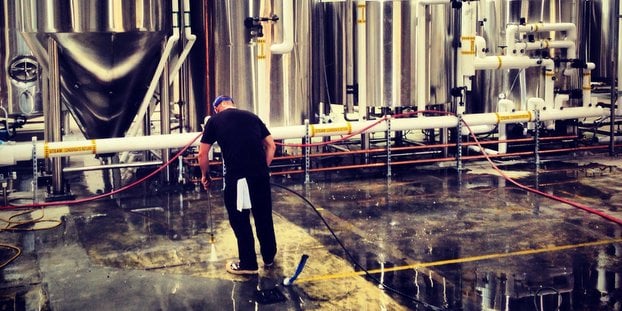
California brewery owners that are trying to ensure they stay in compliance with California labor and employment laws can find it a daunting task, often times leaving behind a bitter taste. Each year there seems to be a deluge of difficult new laws and changes to existing requirements, keeping breweries “hopping” within the maze of rules and regulations within the Golden State. Plus, the risk of non-compliance continues to rise. It is not uncommon that one lawsuit or administrative complaint has the potential to sink a growing business. With that in mind, let’s focus on the most essential issues facing your brewery. Ensuring compliance on these issues or developing the following practices will substantially reduce your risk.
1. Independent contractors
Misclassifying a worker as an independent contractor is a source of significant potential liability. Generally, a worker should not be classified as an independent contractor if the brewery controls when, where, and how the worker does the job or otherwise manages the worker’s performance. Courts have also analyzed whether the work performed by the contractor is integral to the company’s business or whether the worker is free to work with other businesses.
If the person meets any of these factors, then strongly consider classifying the person as an employee and not an independent contractor. If you decide to classify a worker as an independent contractor, then the brewery should use a written independent contractor agreement that specifically describes, at least, the project the person is working on, the limited length of the contract, the compensation, and it should clearly state the person is an independent contractor. This issue may arise with brewmasters or marketing professionals and other specialized workers. Given their importance to a brewery and its growing business it is essential to ensure the working relationship is consistent with the law.
2. Get an employee handbook and consistently follow the policies
Your brewery should develop policies that address the following issues: anti-discrimination, retaliation and harassment; meal periods and rest breaks; timekeeping; leaves of absence; workplace violence; and workplace injuries. Also strongly consider developing policies covering: at will employment; electronic device usage; proper use of company property; confidentiality; conduct and discipline; paydays; expense reimbursement and anti-alcohol and drugs.
Consistently follow brewery policies and train your employees and managers to follow and consistently enforce them. It is not enough to have a policy; company practice must reflect the policies on a daily basis. Even in situations with a smaller number of employees, and especially in breweries with a tasting room or retail component, it is very helpful to be able to lean on established rules to make sure each employee’s conduct is within company expectations.
3. Develop disability/injury evaluation process
Plan a process for ensuring employees report work injuries for workers’ compensation purposes. Evaluate whether employee injuries, illnesses, or other ailments qualify as disabilities and whether any protected leave is available, or if the brewery can reasonably accommodate the employee’s disability or injury. Ensure that employee reports regarding the progress of their injury or illness situation are promptly responded to with the appropriate notices and continuous and consistent communication. This is particularly the case for breweries because in many situations there is some amount of physical, and potentially injurious, work to brew and transfer the beer.
4. Consistently enforce anti-harassment, discrimination and retaliation policy
Ensure your policy is up to date. Train your employees to aggressively enforce it and investigate complaints and reports of misconduct. Investigations should include interviews with the witnesses and a written conclusion based on the facts you gathered stating whether the person violated the brewery’s policy. If the policy was violated, give an appropriate discipline to the offending employee and report the conclusion to the victim. Again, where there is tasting room or retail environment there may be more situations in which these types of complaints may arise and quickly and thoroughly addressing the complaints will help insulate your brewery from risk and provide for a better working environment for all employees.
5. Ensure compliance with wage and hour and timekeeping laws
Breweries must comply with the following wage and hour: minimum wage (at least $10.00/hour and may be more in your city or county — check local requirements); accurate timekeeping for all time worked; pay overtime (all hours over 8 in any day or over 40 in a week); meal and rest breaks (a 10 minute rest break for every 4 hours worked (or major function thereof) and an off duty 30 minute meal period when the work period exceeds five hours (unless there is a valid meal period waiver in instances when the employee will work less than 6 hours); pay wages at least twice during each calendar month; check that paystubs include statutorily required information; and promptly pay terminated employees (on the day of termination) or when employees resign (within 72 hours of resignation date).
While there are additional issues that would allow a brewery to further reduce its risk of violating California employment laws, ensuring compliance with these issues will generally reduce the most substantial areas of potential legal risk and liability. If you have questions about any of these issues, or are concerned about your company’s current risk in these areas, we strongly advise consulting an employment law specialist to further assess how these issues apply to your brewery and to adopt appropriate policies and practices.
Joel M. Van Parys is an attorney with Carothers DiSante and Freudenberger LLP in Sacramento. He represents California employers in all aspects of the employer/employee relationship. This includes litigation defense of claims for wrongful termination, discrimination and harassment, retaliation, wage and hour violations, employee misclassification — with an emphasis on independent contractor claims — and unfair competition. Van Parys can be contacted at [email protected] or (916) 361-0991.






Leave a Reply
You must be logged in to post a comment.